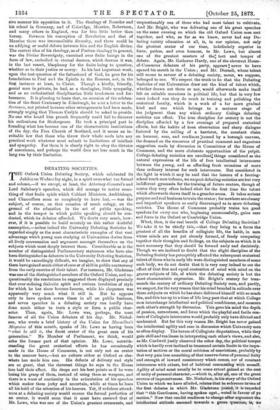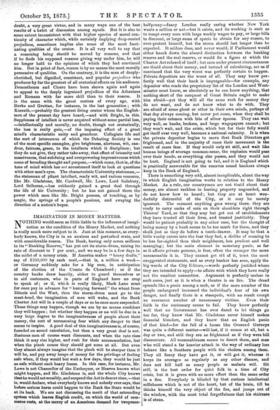DEBATING SOCIETIES.
THE Oxford. Union Debating Society, which celebrated its Jubilee on Wedneslay night, in a spirit somewhat too formal and solemn,—if we except, at least, the Attorney-General's and Lord Salisbury's speeches, which did manage to revive some- thing of that frolic spirit which Cabinet Ministers, Archbishops, and Chancellors seem so completely to have lost, — was the subject, of course, on that occasion of much eulogy, on the ground of the education in the art of public speaking, and in the temper in which public speaking should be con- ducted, which its debates afforded. We doubt very much, how- ever, if it is possible to build securely on this rather doubtful assumption,— unless indeed the University Debating Societies be regarded simply as the most characteristic examples of that vast advantage which young men studying at Universities derive from all lively conversation and argument amongiit themselves on the subjects which most deeply interest them. Considerable as is the number of distinguished Parliamentary statesmen who have also been distinguished as debaters in the University Debating Societies, it would be exceedingly difficult, we imagine, to show that any of them have gained much either of ease or of skill in public controversy from the early exercise of their talent. For instance, Mr. Gladstone was one of the distinguished members of the Oxford Union, and un- questionably the resolutions he suggested there displayed precisely that over-refining dialectic spirit and curious involution of style for which he has since become famous, while his eloquence was apparently very much what it still is. But he appears only to have spoken seven times in all on public business, and seven speeches in a debating society can hardly have done much either to train a style or form a public char- acter. Then, again, Mr. Lowe was, perhaps, the most famous of all the Union debaters of his day. Mr. Nichol- son, who wrote a brief history of the Union for Macmillan's Magazine of this month, speaks of Mr. Lowe as having been " what he still is, the finest orator of the great ones of his generation." No Member of Parliament, we think, would echo the former part of that opinion. Mr. Lowe, notwith- standing the great oratorical efforts he has occasionally made in the House of Commons, is not only not an orator to the manner born,—but no culture either at Oxford or else- where has made him one. His defects of delivery and style are so great, that the cleverest things he says in the House lose half their effect. He drops out his best points as if he were losing his grasp of them, instead of using them as weapons, and there is a want of continuity in the articulation of his speeches which makes them jerky and uncertain, while at times he loses all his hold of the attention of his hearers. Yet, if sedulous attend- ance at a debating society would ensure the formal perfection of an orator, it would seem that it must have ensured that of Mr. Lowe, who was one of the Union's greatest ornaments, and unquestionably one of those who had most talent to cultivate. And Mr. Bright, who was delivering one of his great speeches on the same evening on which the old Oxford Union men met together, and who, as far as we know, never had any De- bating society education at all, is, in our opinion, not only the greatest orator of our time, indefinitely superior in force, pathos, and even humour, to Mr. Lowe, but almost one of the greatest masters of the; tact and temper of debate. Again, Mr. Gathorne Hardy, one of the cleverest House- of-Commons debaters of his party, appears ?, never to have opened his mouth in the Union ; and Mr. Disraeli, whose talent still seems to savour of a debating society, never, we suppose, belonged to one. We suspect the truth to be that the Debating 8scieties of our Universities draw out the kind of talent which, whether drawn out there or not, would afterwards make itself felt on suitable occasions in political life, but that in very few cases indeed can they do much in training and polishing the oratorical faculty, which is a work of a far more gradual kind and one which belongs to a maturer stage of the judgment than any which ordinary College debating societies can effect. The true discipline for oratory is not the discipline afforded by a few evenings of prepared oratorical efforts, but the habits of keen observation and sharp dialogue fostered by the calling of a barrister, the constant claim on humour, ease, and readiness :caused by a borough canvass, the demand on the resources of practical comment and sagacious suggestion made by discussion in Committees of the House of Commons, and the more elaborate opportunities of the pulpit. College debating societies are excellent; things considered as the natural expressions of the life of free intellectual intercourse between the young, and as affording fresh occasions of more than ordinary interest for such intercourse. But considered in the light in which it may be said that the lessons of a fencing- school teach men tofence, we suspect debating societies are but very indifferent gymnasia for the training of future orators, though of course they very often indeed elicit for the first time the talent which afterwards shows itself in a grander arena. It takes serious purpose and real business to train the orator; for nowhere are clumsy and imperfect speakers so easily discouraged as in mere debating societies. The House of Commons probably trains ten good speakers for every one who, beginning unsuccessfully, gains ease and force in the Oxford or Cambridge Union.
What, then, is the real benefit of College Debating Societies? We take it to be chiefly this, —that they bring to a focus the greatest of all the benefits of collegiate life, the habit, in men whose minds are not yet already formed, of freely comparing together their thoughts and feelings, on the subjects on which it is most necessary that they should be formed early and decisively. Though we are inclined to doubt that the alight discipline of the Debating Society has perceptibly affected the subsequent oratorical talent of those who in early life were distinguished members of some such body, we do not doubt that it is very easy indeed to see the effect of that free and equal contention of mind with mind on the graver subjects of life, of which the debating society is but the most characteristic expression. Mr. Bright's oratory far tran- scends the oratory of ordinary Debating-Society men, and partly, we suspect, for the very reason that his mind brooded in solitude over those subjects on which he has since delivered himself with so much fire, and this too up to a time of life long past that at which College men interchange intellectual and political confidences, and measure each other's strength by discussion. This gave his mind the depth of passion, earnestness, and force which the playful and facile con- tests of Collegiate intercourse would:probably only have diluted and moderated. But for this very reason Mr. Bright has never gained the intellectual agility and ease in discussion which University men so often display. The heroes of Collegiate disputations, while they gain skill and readiness in interpreting each other's views, and also, as Mr. Cardwell justly observed the other day, the political temper which is hardly ever inclined to transcend certain limits in the impu- tation of motives or the moral criticism of convictions, probably by that very gain lose something of that reserve-force of personal fixity and strength of inward consistency which comes, not of constant intercourse with others, but of habitual communing with oneself. Agility of mind must usually be to some extent gained at the cost of unity of personal character,—which is, after all, one of the great sources of impressiveness. Mr. Nicholson, in his story of the Oxford Union to which we have alluded, relates that in reference to one of the first debates in which Mr. Gladstone joined, it is recorded that "this Gentleman, having spoken agst, voted in favour of ye motion." Now that candid readiness to change after argument the intellectual attitude assumed towards a grave question, is, no
doubt, a very great virtue, and in many ways one of the best results of a habit of discussion among equals. But it is also to some extent inconsistent with that higher species of moral con- tinuity of character which, while certainly implying deep-rooted prejudices, sometimes implies also some of the most fasci- nating qualities of the orator. It is all very well to say that a reasoning being should be moved by reasons, and that if he finds his supposed reasons giving way under him, he will no longer hold to the opinions of which they had convinced him. But in point of fact, reason is by no means the most morally persuasive of qualities. On the contrary, it is the man of deeply- cherished, but dignified, consistent, and popular prejudices who produces by far the greatest of all oratorical effects on his audience. Demosthenes and Cicero have been shown again and again to appeal to the deeply ingrained prejudices of the Athenians and Romans with far more skill than to their reason. It is the same with the great orators of every age, with Burke and Grattan, for instance, in the last generation ; with Kossuth,—probably the greatest living orator whom the English- men of the present day have heard,—and with Bright, in this. Suppleness of intellect is never acquired without some partial loss, —intellectually and morally, no doubt, though not oratorically, the loss is really gain,—of the imposing effect of a great mind's characteristic unity and grandeur. Collegiate life and the sort of intercourse of which the Debating Society is one of.the most specific examples, give brightness, alertness, wit, can- dour, fairness, grace, to the intellects which it disciplines ; but they do not give, they rather take away, that effect of intensity and massiveness, that subduing and overpowering impressiveness which come of brooding thought and purpose,—which come, that is, of the tone of mind which has not accustomed itself to look at questions with other men's eyes. The characteristic University statesman,— the statesman of pliant intellect, ready wit, and various resource, like Mr. Gladstone, Mr. Cardwell, Mr. Lowe, Lord Salisbury, Lord Selborne,—has evidently gained a great deal through the life of his University ; but he has not gained there the power which men like Mr. Bright possess, of touching, as by magic, the springs of a people's passions, and swaying the direction of a nation's hopes.







































 Previous page
Previous page